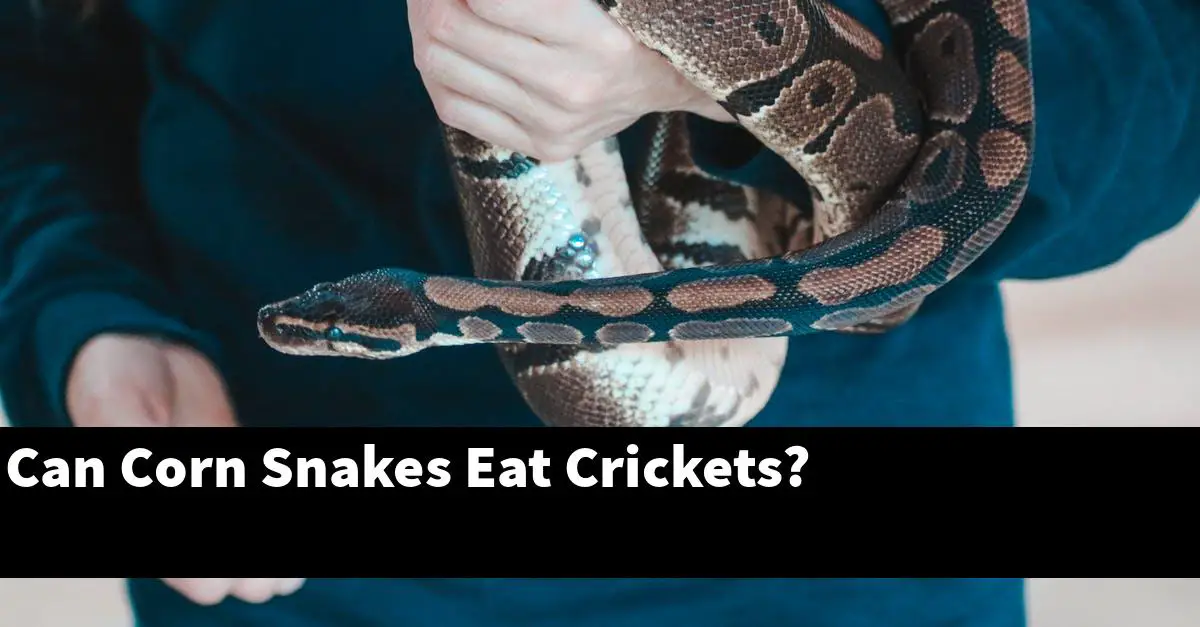Corn snakes are able to eat crickets as part of their diet. Crickets provide a good source of nutrition for corn snakes, including protein and fat.
The article will cover what types of food corn snakes can eat, how often they should be fed, and what to do if a corn snake refuses to eat.
Table of Contents
Can I feed my snake crickets?
Yes, you can feed your snake crickets. Crickets are a good source of protein and other nutrients for snakes. They are relatively easy to catch and can be found in most pet stores.
What is the nutritional value of crickets for corn snakes?
Crickets are a common food source for corn snakes and other pet reptiles. They are relatively easy to care for and provide a good source of protein and other nutrients.
Crickets are high in protein and fat, and contain all the essential amino acids that reptiles need. They are also a good source of calcium, phosphorus, and other minerals.
Crickets should be offered to corn snakes on a regular basis, as part of a well-balanced diet. In addition to live food, corn snakes should also be offered a variety of frozen/thawed and fresh foods. A variety of food items helps to ensure that your corn snake gets the nutrients it needs to stay healthy.
What are the benefits of corn snakes eating crickets?
Corn snakes are a type of rat snake that is found in the southeastern United States. They get their name from their habit of eating corn. Corn snakes are non-venomous and are popular pets because they are docile and easy to care for.
Corn snakes are insectivores and their diet consists mostly of crickets. Crickets are a good source of protein and essential nutrients for corn snakes. They are also a good size for corn snakes to eat. Corn snakes can eat up to 10 crickets per day.
Crickets are also a good source of exercise for corn snakes. They have to chase and catch the crickets, which helps them stay active and healthy.
There are a few benefits to feeding your corn snake crickets. Crickets are a good source of protein and essential nutrients. They are also a good size for corn snakes to eat. Corn snakes can eat up to 10 crickets per day. Crickets are also a good source of exercise for corn snakes.
Are there any risks associated with corn snakes eating crickets?
Crickets are a common food source for corn snakes, and they are generally considered to be safe. However, there are a few potential risks to be aware of.
For one, crickets can harbor bacteria and parasites that can be harmful to snakes. It’s important to only feed your snake crickets that have been properly cleaned and gutted.
Additionally, crickets can jump and bite, which can be dangerous for snakes. When feeding crickets to your corn snake, be sure to supervise and remove any crickets that seem overly aggressive.
How often should corn snakes eat crickets?
A corn snake should typically eat one to two crickets every day. However, this may vary depending on the individual snake’s size and appetite. It is important to offer corn snakes a variety of sizes of crickets to ensure they are getting the nutrition they need.
What can you feed corn snakes other than mice?
Corn snakes are one of the most popular species of pet snakes, and they are typically fed a diet of live mice. However, there are a few other options that can be offered as well, such as:
- Gerbils
- Rat pups
- Quail
- Chicks
Offering a variety of different prey items will not only keep your corn snake healthy but also help to keep them mentally stimulated. Just be sure that whatever you feed is appropriately sized for your snake – too large and they may have difficulty digesting it, too small and they may not get the nutrition they need.
What should you not feed a corn snake?
A corn snake’s diet should consist primarily of small rodents, such as mice or rats. It is important to note that corn snakes should only be offered food that is no larger than the widest part of their body. This is to prevent the corn snake from becoming overweight or from choking on its food.
There are a few things that you should not feed your corn snake. These include:
- Fish: Fish is food that should be avoided. Fish are high in fat and can be difficult for corn snakes to digest. In addition, fish bones can cause intestinal blockages.
- Reptiles: Reptiles, such as lizards and snakes, should not be offered to corn snakes. These animals can carry diseases that can be transmitted to corn snakes. In addition, reptiles can be difficult for corn snakes to digest.
- Amphibians: Amphibians, such as frogs and toads, should not be offered corn snakes. These animals can carry diseases that can be transmitted to corn snakes. In addition, amphibians can be difficult for corn snakes to digest.
- Birds: Birds, such as chickens and ducks, should not be offered to corn snakes. These animals can carry diseases that can be transmitted to corn snakes. In addition, birds can be difficult for corn snakes to digest.
What do corn snakes eat in captivity?
Corn snakes feed primarily on rodents in the wild. In captivity, they can be fed a diet of frozen/thawed rodents or live rodents. Live feeding should be done carefully to avoid injury to the snake or the prey. Frozen/thawed rodents should be offered to the snake 1-2 times per week.
Summary
Corn snakes can eat crickets as part of their diet. Crickets provide a good source of nutrition for corn snakes, including protein and fat.

